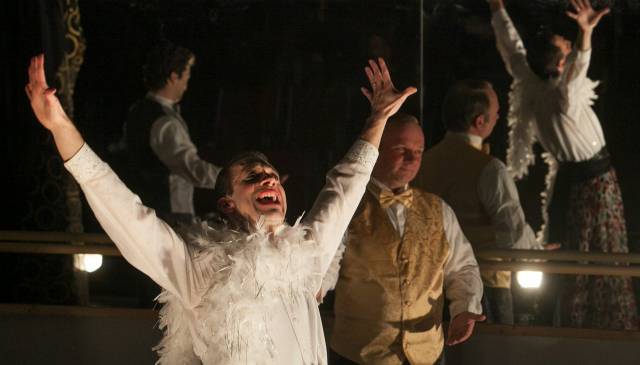

“Life upon the wicked stage ain’t ever what a girl supposes,” Oscar Hammerstein II famously noted. Now French playwright Jean-Luc Lagarce concurs.
Lagarce’s play Music Hall (mounted by TUTA Theatre Chicago at 59E59 Theaters in a version translated by Joseph Long and directed by Zeljko Djukic) describes the familiar travails in the daily life of the itinerant variety performer. We’re told of the chronic poverty, the prospect of being pelted not only by vegetables but also by bottles and forks; the vagaries in personal relationships in a world in which you may be abandoned by fellow performers suddenly and without notice; and the indignity of growing old in the unflattering glare of stage lights.
I’m not certain that Lagarce says anything particularly original about any of this. But Djukic and his three actors certainly present it all in an entertaining fashion.
The play is simply staged on a set consisting of mirrored walls, a diagonally placed theatre curtain, a ladder, a trunk, and a much-discussed revolving stool. In elaborately detailed fashion, a stage-struck character (played by Jeffrey Binder) rapturously describes the performance of a performer known as “The Artiste.” Gradually Binder becomes The Artiste, a beleaguered songstress touring perpetually in “gray suburbs.” He dons a skirt and dangling earrings, applies lipstick and rouge, and begins speaking in first person as the unfortunate diva. Meanwhile, we are shown the perspective of The Artiste’s two supporting players, portrayed with relish by Michael Doonan and Darren Hill.
The Lagarce/Long script is written in free verse and has a repetitive, Beckettian quality. (Its lines about filling time and pretending to exist could have been lifted from Waiting for Godot.) What’s on the page provides only vague hints about the characters and their lives — so it’s to the credit of Djukic and the three performers that the world of the play is so comprehensible, lively, and richly appointed.

Binder is especially enjoyable as the imperious but ultimately rueful Artiste. In a climactic scene the character undergoes a meltdown in which, at the performance I saw, Binder effectively decimated a ratty black feather boa. (After the show, I even noticed pieces of it reduced to dust bunnies on the floor outside the theater.) Doonan and Hill add specificity to their rather generically written characters, making clear the nature of their relationships with each other and with The Artiste. The two also contribute greatly in the singing/dancing department. Their performance of an interpolated “By the Time I Get to Phoenix” (with Doonan playing a mournful harmonica) will likely leave that tune stuck in your head for hours.
What Lagarce doesn’t deliver is an in-depth exploration of why — having heard all the truisms about the wicked stage — certain people will nevertheless be attracted to that life and will never leave it, however unhappy and broke they may be. Noël Coward once posed the musical query “Why Must the Show Go On?” Asking someone like Lagarce’s Artiste that question is about as sensible as asking an inquisitive toddler to stop looking at the pretty colored lights.